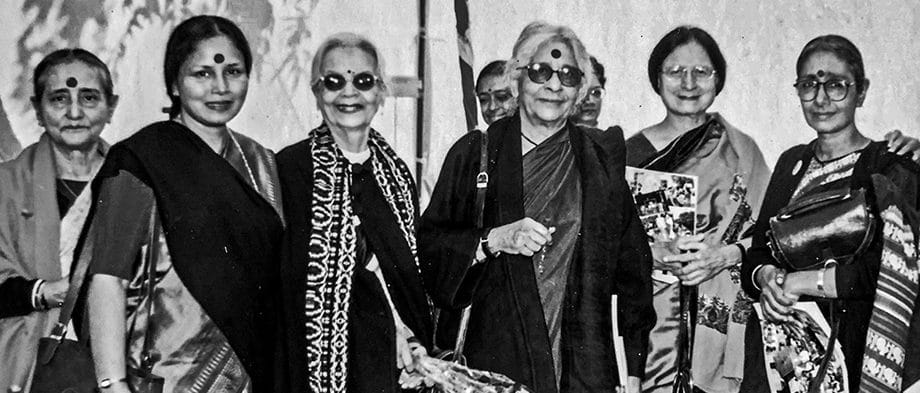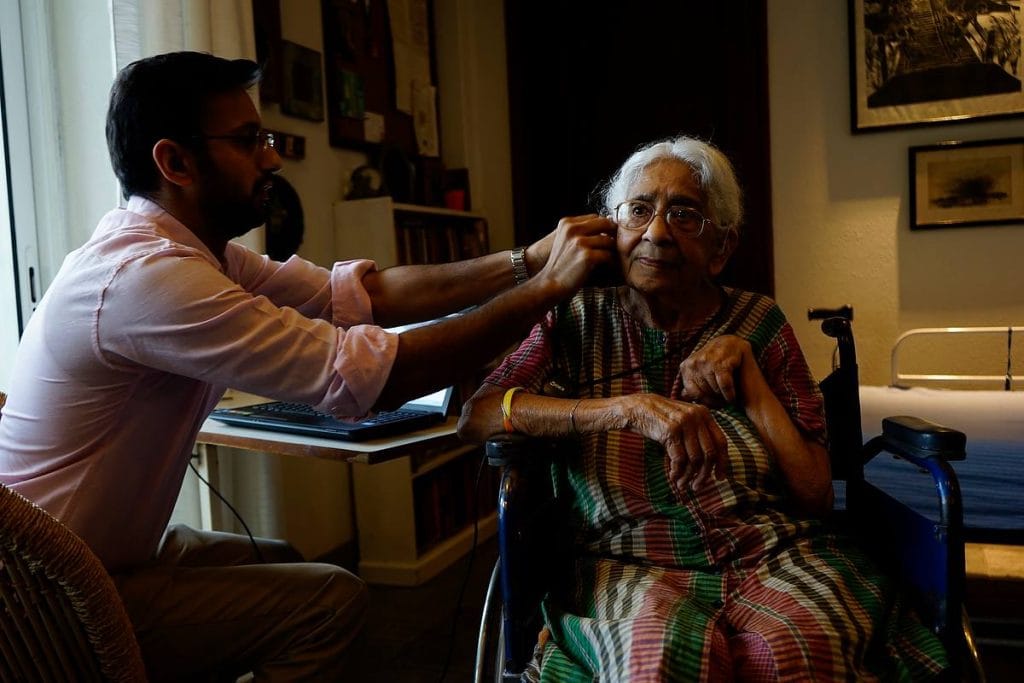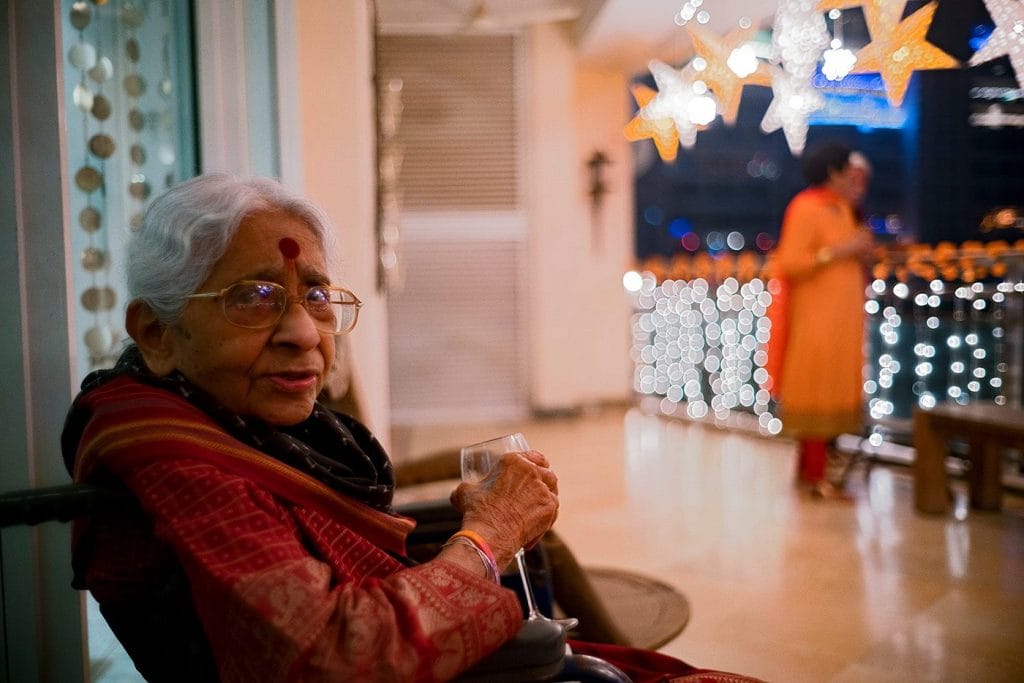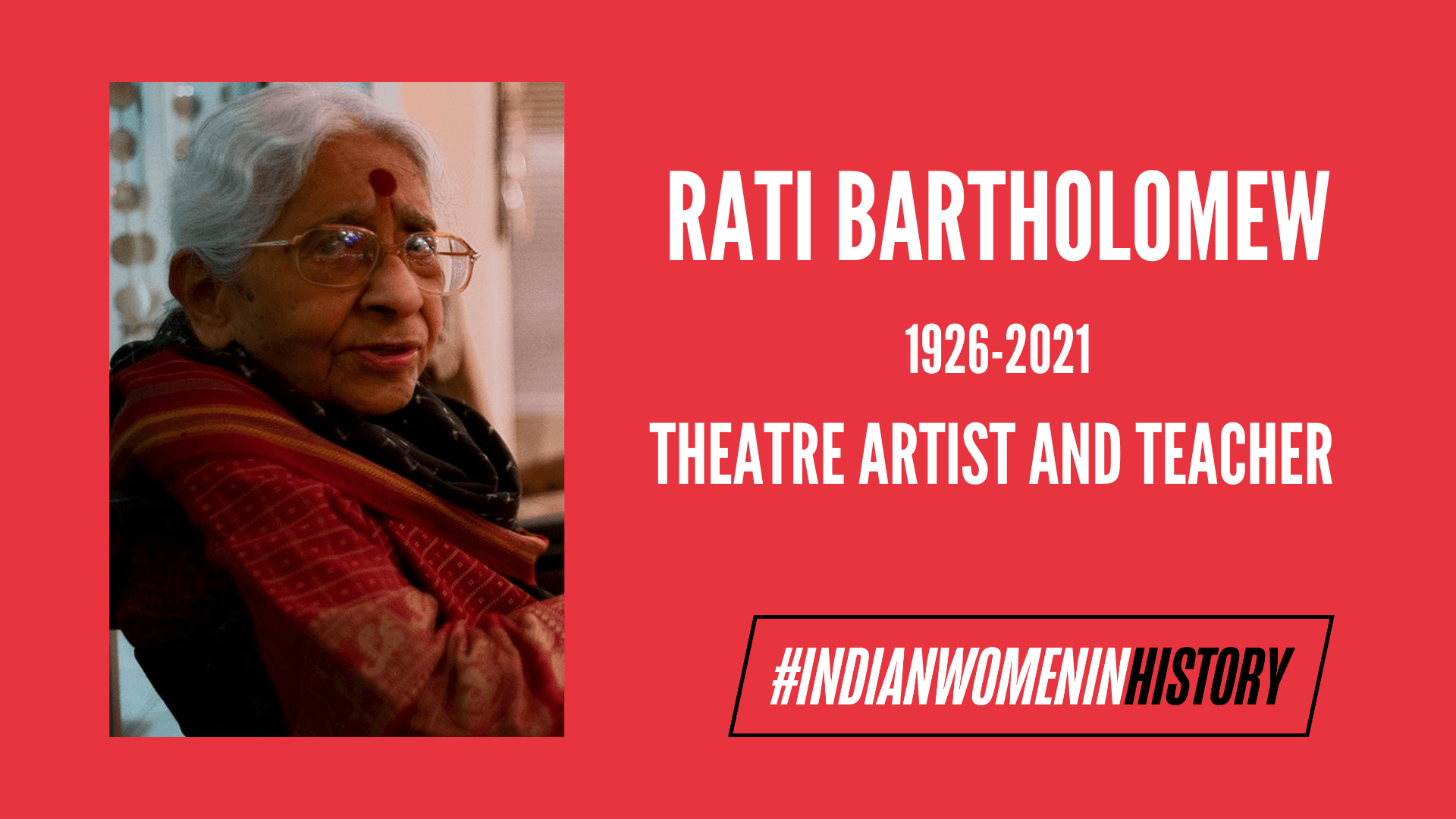Rati Bartholomew can easily be counted amongst the first architects of the Delhi theatre scene, if not the overall theatre activism of India. As a director, actor, playwright, as well as intellectual, amongst many images of her, she embodied the progressive approach within and through theatre towards engagement with politics, conflicting ideas, and identities. Throughout the 60s, 70s, and 80s, even up until the early 2000s, her contribution to the theatrical sphere remains extraordinary. Her work with drama extends the performance space in her professional capacity as a professor at Delhi University, where she mobilised student engagement of the drama form with more contemporary issues.
From co-founding Yatrik, one of the first bilingual theatre groups in Delhi; serving as the vice president of Dishantar; co-founding SAHMAT (Safdar Hashmi Memorial Trust); and serving as guest faculty at the National School of Drama, she has lived several lives. And all her lives were connected to each other through the string of her ambition for theatre. Living in a time of political, social, cultural, and economic reforms (sometimes regressions, oppressions, and even divisions), she became a part of the community of emerging street theatre artists who took on the role of activists, introducing theatre activism that engaged with socio-political realities on the ground as performance.
Rati Bartholomew’s early life
Though Bartholomew was an individual who kept her private life away from her public life, some facts are known to her students, mentees, and various other acquaintances, such as Tripurari Sharma, who share them in their obituaries upon her unfortunate demise at the age of 94 in 2021. Most of the information that one can find about her is available to us from obituaries and memorials written online.

She was born in 1926 in Calcutta to Supriti and Attar Chand Batra. Her mother was a member of the Cooch Behar royal family, while her father was a barrister practicing at the Calcutta High Court. They moved back to Pakistan to stay at Batra’s native place. She attended college in Lahore when the 1947 partition uprooted their family. On one of her trips to Pakistan later in life, she was able to trace back to her ancestral home in Sargodha, which was preserved by the family living there.
Forced to relocate to Delhi as refugees, she studied at the prestigious St. Stephens College in Delhi University. Which is where she met her future husband, Richard Bartholomew, an artist, painter, photographer, art critic, and curator during the late 40s. Richard was a Burmese refugee who had fled Burma (now Myanmar) during World War II. Displaced pasts and a love for the arts drove the couples’ future endeavours as professionals within their fields. This is recounted by their child, Pablo, in his interview with Zhuang Wubin. Pablo followed in his father’s footsteps to be a photographer and a photojournalist, capturing the realities of tragedies (social and political) as recounted within Smitha Venkateswaran’s interview with him. He was also awarded the WPP (World Press Photo) prize.
Frequently, Rati featured in both Richard and Pablo’s photographs as a towering figure but was equally enamouring within her real life as a professor at Indraprastha College for Women, University of Delhi, where she wore a big bindi drawn on with lipstick, a French slickback bun, and sarees.
Setting the stage
Anuradha Kapur, in her obituary to Rati, writes that she was heavily involved in campus theatre, where she mentored student theatre groups along with college drama societies by conducting workshops, helping young people connect with people across the theatre culture, etc. While teaching at IPCW, she was active in many theatre groups during the 1960s, including Yatrik as well as Dishantar, the onset of the bi-lingual theatre scene in Delhi.

She was one of the founding members of Yatrik Theatre in 1964, along with Kusum Haider, Sushma Seth, Joy Michael, Roshan Seth, etc. She portrayed a character role in Yatrik’s very first production of ‘All the King’s Men,’ directed by Marcus Murch. She also served as the vice president of the Dishantar theatre group (founded in 1969). While actively participating in the production and the performance spaces of theatre, Rati acted as a consistent writer of reviews, essays, criticisms, and engagement pieces, as well as theoretical analyses of emerging theatrical practices as well as up-and-coming productions.
For SAHMAT’s All India Street Theatre Festival called Chauraha, she wrote an article in the promotional catalogue titled, On the Dramatic Performances Act: Censorship in Theatre. This essay was foremost in line for SAHMAT’s campaign against the draconian colonial 1876 Dramatic Performance Act, which aimed to police ‘seditious‘ performances, as recounted by Anuradha Kapur in her obituary to Bartholomew in News Click. She also researched the Dramatic Performances Act for Anamika Haskar’s production on the same called Raj Darpan performed with the students of the National School of Drama in 1994 and further at the NSD Repertory Company. She wrote a review of Adya Rangachari’s Suno Janmejya directed by Mohan Maharishi, the first Hindi production for the same, in a publication titled Thought. This production, according to her, brought ‘new forms, new languages, and forged in the hands of a new generation of theatre-makers.’ These were a few of her analytical approaches to the shifting dynamics of thematic constructions and the processes of production within the rising theatre scene of Delhi.
Bartholomew was invited as a guest faculty member and an examiner at the National School of Drama by NSD’s director at the time, Ebrahim Alkazi. There she would introduce theatre students and their works in magazines, publications, etc. thorough reviews while encouraging them to come out of a training-intensive scholastic space to a more production-orientated space. She would implore her inclined students, both at NSD and IPCW, to venture out into the world of theatre by acquainting them with who’s who of theatre. Her involvement with young drama enthusiasts is very much visible in her intent to work with her students as well as contemporaries in a collaborative effort, such as her direction of Tripurari Sharma’s Bahu or Aks Paheli.
She was very enamoured with stirring usage of props for elaborate dramatic effects, which was very famous within the theatre circles of which she was a part. Her directional usage of props demanded strength and power from her actors.
Stage of politics
Around the late 1970s and onwards, Rati became an active street theatre-ist. She worked on more political narratives, stories, and adaptations to shed light on the socio-political systems of power. Her rendition of Manto’s Toba Tek Singh as well as Marz ka Munafa in collaboration with the Theatre Union (formed in 1979) was staged across many cities. She was a staunch advocate for theatre groups and believed that they could easily become a bridge between socio-political reality and the narrative. She collaborated with many women’s groups across India, Pakistan, and Bangladesh to produce and direct plays, organise workshops, etc. for mobilisation of the people. During this time she visited both the nations on several occasions and worked extensively with feminist groups while incorporating her own ideas of feminist politics into theatrical mobilisation.

Her engagement with ongoing political turmoils was poignant in the productions in which she collaborated with her contemporaries, such as Farak in 1989, which focused on property inheritance laws in Hindu, Christian, and Islamic personal law boards, highlighting the case of Mary Roy (mother of Booker Prize awardee Arundhati Roy).
SAHMAT as an initiative began with a memorial trust for the memory of Safdar Hashmi, a political activist, playwright, actor, etc., after he was fatally attacked and succumbed to the injury while performing a street play in Sahibabad. Rati Bartholomew, as the co-founder of the trust, ensured a continued resistance against stringent colonial laws and an everlasting interrelation between politics and theatre. Bartholomew’s involvement with street politics pushed forward a tradition of social theatre that is still followed today.
Rati Bartholomew suffered a stroke, and half her body was paralysed due to it, something that Rosalyn D’Mello mentions in her obituary. She passed away on September 23rd, 2021, at her second son, Robin’s house in Gurugram.
Rati continues to be an imposing figure within the theatre scene of India by invoking a social consciousness into the emerging ideological landscape of theatre in Delhi. Her political involvements underscore her contribution to the craft, while her creative self drives parallel to the introduction of a new kind of symbolic identity within post-independence dramatics.
References:
- https://economictimes.indiatimes.com/opinion/interviews/you-must-be-objective-to-perform-well-pablo-bartholomew/articleshow/7219639.cms?from=mdr
- https://www.newsclick.in/rati-bartholomew-4-january-1926-23-september-2021
- https://thewire.in/the-arts/remembering-rati-bartholomew-yatrik-theatre
- http://www.sacw.net/article14744.html?utm_source=chatgpt.com
- https://www.mid-day.com/news/opinion/article/a-legacy-of-magnificence-23194600?utm_source=chatgpt.com
- https://invisiblephotographer.asia/2012/04/19/interview-pablobartholomew/
- https://sahmat.in/intropage.html
About the author(s)
Harsha is a post-graduate student of English Literature from Delhi University. Their particular area of interest is Gender studies through the multidisciplinary lens. They have published various articles on the same as well as worked on 2 reports with Lokniti, CSDS. They have also presented various papers on the gender relations of the socio-cultural intersectional margins with the mainstream within different disciplines of Humanities and Social Sciences.





